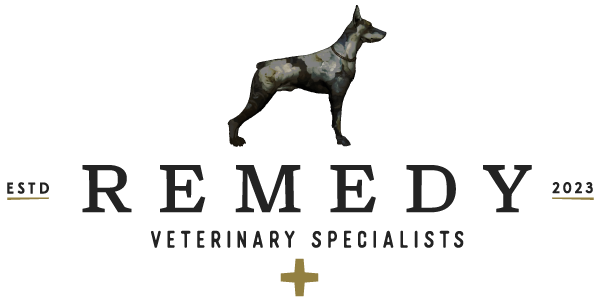Conservative Care of Intervertebral Disc disease (IVDD) in Dogs
Introduction to iVDD
A majority of dogs presenting with signs of spinal cord disease have a ruptured disc. Some people also call this slipping a disc. Either name is fine. A slipped disc is so common in dogs that often we will just assume that is what is causing your dog’s spine problems until we find out otherwise. To really figure it out, we need an MRI, but not all dogs with spinal signs need an MRI. For dogs with mild symptoms, or in sitatuations where advanced testing and treatments are not an option, we will often try conservative management.
Conservative management means we use strict bed rest and medication to help your dog get better. The rest is the hardest part, but it’s also the most important part.
The disc is a cushion between the bones of the spine. It helps make the spine flexible and it’s also a shock absorber. In a slipped disc, there is a small tear in the disc that lets the inner jelly squirt out. This jelly puts pressure on your dog’s spinal cord, causing weakness and pain. The reason we want your dog to rest is that we want that tear to heal before any more jelly can squirt out.
How to Rest your dog
The single most important part of conservative management is crate rest. This means your pet needs to be confined to a small crate, pen or small room like a laundry room. This space should be just large enough for your dog to stand up comfortably and turn around and they should not have any access to furniture. Ideally this space should be about 3 feet by 4 ft for a small dog, and 4ft by 5ft for a large dog. You want them to have just enough space for them to have a bed and a bowl of water. We also want to make sure that the enclosure is tall enough that they can stand up and turn around comfortably.
Your dog should be in this space at all times except for three short 10 minute leash walks a day. If your pet has neck pain, they should wear a harness (rather than a neck collar) and all walks should be done with the leash attached to the harness.
If your pet is small enough, you may hold them while you are doing activities like reading or watching TV. You must have direct physical control over them at all times. If you need to get up, even for just a second, you need to put them back in the crate first. If you have a larger dog, you can tie them via a harness to a large part of the furnitute. The goal is to make sure you have complete control of your pet, even if something unexpected happens- like the mailman coming to the door. It is important that they not sleep in the bed with you, or be on the furniture unsupervised. Unfortunately many pets will get much worse after doing something like jumping off a couch or bed. It only takes a split second for them to really hurt themselves. Be careful!
We know how difficult it is to enforce the rest, but remember you are doing this for them. Think of it as tough love.
Full recovery of a presumed slipped disc takes a minimum of 4 weeks of strict rest, followed by a period of gradual return to activity. It's important to finish the whole treatment, even though your pet may feel better much sooner. Stopping treatment too early is a common cause of relapses.
Medications
Often we will prescribe a combination of anti-inflammatories, pain medications and sedatives to help your dog during recovery. Medications will help your pet be calmer and more comfortable, but they will not fix the problem. Rest and time are what help your pet heal.
Anti-inflammatories: Prednisone, NSAIDS.
Pain medications: Gabapentin, Tramadol, Amantidine
Muscle relaxers: Methocarbamol
Sedatives: Trazodone, Acepromazine.
Signs you need to see a Veterinarian ASAP
Unfortunately conservative management is not right for every pet. Despite our best efforts, some dogs will need things like surgery to get better.
If your pet is experiencing any of the following please seek emergency veterinary advice:
1) Moderate to severe pain despite medication
2) Unable to stand/walk even for a step
3) Has not urinated in over 24 hours
If your pet is not improving over the course of several weeks, or you feel at any point they are starting to get worse, contact your veterinarian for advice.
Contact Us:
Mon \ Fri: 8:30am - 5:30pm
Sat: by appointment only
Phone: (415)967-3303
Email: frontdesk@remedyvets.com







